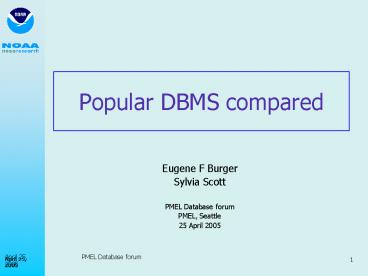Popular DBMS compared PowerPoint PPT Presentation
1 / 20
Title: Popular DBMS compared
1
Popular DBMS compared
- Eugene F Burger
- Sylvia Scott
- PMEL Database forum
- PMEL, Seattle
- 25 April 2005
2
Which databases?
- Microsoft SQL Server
- Oracle
- MySQL
3
Grounds for comparison
- Editions
- Platforms
- Features
- Price
- RDBMS highlights and lowlights
- Overview
4
RDMS editions - MySQL
- MySQL
- Cluster
- MaxDB
- SAP Certified version of the database
- MySQL Pro
- innoDB storage engine
- Classic
- MyISAM storage engine
5
RDMS editions SQL Server
- Personal edition
- Development non deployment
- Workgroup edition
- Desktop use
- Standard edition
- Full edition with most of the functionality
- Neutered to support only 4 processors
- Enterprise edition
- Includes OLAP support
- Up to 32 processors
6
RDMS editions Oracle
- Standard Edition
- Standard One
- 4 Processor version
- Enterprise edition
- All the bells whistles
7
Platforms
- MySQL
- Most operating systems
- SQL Server
- Only Windows platforms
- Server editions
- Desktop OS
- CE
- Oracle
- Most operating systems
- Recently ported to Mac OS-10
8
Pricing - overview
Oracle SQL Server
Standard per proc. 2500K 3400
Standard per seat 400 (named user)
Enterprise per proc 20K 12800
Enterprise per seat 400
9
Pricing MySQL
- Nada
10
Pricing - SQLServer
- Personal edition
- Free
- Workgroup edition
- 3700 per proc.
- Standard edition
- 3244 per proc.
- Enterprise edition
- 19995 per proc. (not GSA price)
11
Pricing Oracle
- Oracle 10g
- Enterprise edition
- 20K per processor
- 400 per named user
- Standard edition
- 2500 per processor
- 250 per named user
- Internet application server
- 5K per processor
- (all GSA pricing)
12
Database findings - MySQL
- Declarative referential integrity only InnoDB
- Transactional processing only InnoDB
- Reliable
- Management tools
- Backups
- Integrity checking
- No Stored procedures, functions, views or
triggers - Ver 5.0 has some of this functionality
- Lack of Transaction log file to rebuild database
from. - From the MySQL documentation
- MySQL Server was designed from the start to work
with medium size databases (10-100 million rows,
or about 100 MB per table) on small computer
systems.
13
Database findings - Oracle
- Only true object relational database server
- Tons of ready to use libraries that ship with the
DB server - PL/SQL is a comprehensive programming language.
- Tight integration with JAVA
- Objects can be used as a column data type
- Writers do not block readers, and readers to not
block writers.
14
Database findings - Oracle
- In my opinion
- Installation is a pain.
- Administration is more cumbersome than any other
DB server I have worked with. - Neat features
- Table schemas
- Partition tables
- Oracle documentation horrid
- Tons of resources (asktom.com)
15
Database findings SQL Server
- Supports all major DB paradigms
- Views, triggers, stored procedures
- XML integration built in
- Tight integration with .Net
- Easy installation (Windows only)
- Low overhead with administration
- TSQL is the SQL flavor
- Great online documentation and resources from
Microsoft Developers Network (MSDN)
16
Database findings SQL Server
- Ships with great administration utilities
- Backup restore
- Database integrity checking
- Scheduler
- Ships with very good DTS tool
- Allows for rapid development of data import,
export or data mangling scripts
17
Overview
- Use the database that suits your application
- MySQL good for mostly read only data applications
(Data warehouse) - Unless you deal with 100s of millions of records
or terabytes of data, you are probably wasting
your money on Oracle - Platform dependency an issue?
- Dedicated database administrator?
18
Overview
- Granularity of administration and tunability
- Oracle takes this to a new level
- Disk block level free space
- User management
- We have consistently found SQL Server to require
the lowest maintenance overhead and the quickest
time to production. - MySQL is a robust data container, although Oracle
and SQL Server allow you to embed business logic
is your database.
19
Finally
- A word about performance
- Check out the TPC site for database benchmarks
- Changes monthly
- Oracle 10g at the top of the list at the moment
- http//www.tpc.org/default.asp
20
Resources
- Product matrix
- MySQL http//www.mysql.com/products/mysql/
- SQLServer http//www.microsoft.com/sql/evaluation
/features/choosing.asp - Oracle http//www.oracle.com/database/product_edi
tions.html - Database comparisons
- Oracle / SQL Server http//www.databasejournal.co
m/features/mssql/article.php/10894_2170201_1 - SqlServer / MySQL http//www.databasejournal.com/
features/mssql/article.php/3087841

